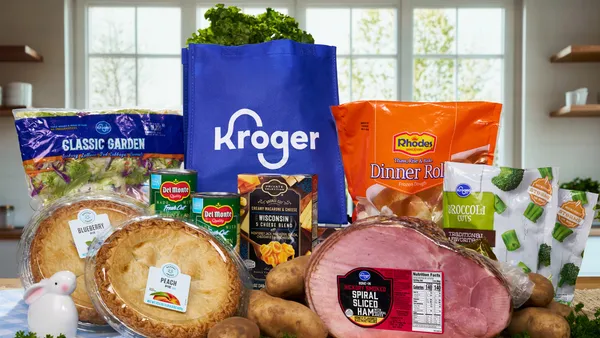Dive Brief:
- H-E-B has partnered with the Environmental Defense Fund to build a stronger commitment to sustainable seafood by sourcing from socially and environmentally friendly farms and fishing outfits, according to the retailer. The retailer updated its policy to improve its sourcing and transparency for fresh, frozen, prepared and shelf-stable seafood.
- The Texas grocer plans to expand traceability, promote "environmental and ethical integrity" in canned seafood, source certified wild-caught and farmed seafood and combat human rights abuses in the supply chain. The company has revised its sourcing grid to include the method of catch, production methods, origins and certifications — all of which are updated twice a year and can be accessed by consumers.
- Meanwhile, BJ’s Wholesale Club has joined the Global Sustainable Seafood Initiative (GSSI), according to a news release. Netherlands-based GSSI works towards providing more sustainable seafood for the planet. Other U.S. retailers that are partners of the GSSI include Ahold Delhaize and Schnucks.
Dive Insight:
By working towards more sustainable sourcing in seafood, retailers like H-E-B and BJ’s are increasing their investment in a critical category. Just last week, FMI’s Power of Seafood report stated that although the seafood seafood sales are small compared to categories like produce and fresh meat, the segment can lead to basket sizes that are triple the average.
Although the overall influence of sustainability pales in comparison to price promotions and merchandising, FMI reports, sustainability tends to be very important to core seafood consumers. According to the recent report, 24% of seafood customers say they put considerable effort into finding sustainable offerings.
According to Greenpace’s Carting Away the Oceans 2018 report, grocery retailers across the nation have greatly improved on seafood sustainability. Whole Foods, Hy-Vee, Aldi and Target ranked the highest. Trader Joe’s dropped the furthest to 14th while H-E-B ranked 19th. BJ’s was not included on the list.
The Marine Stewardship Council, meanwhile, last year found that global seafood consumers want to know that supermarkets are committed to sustainability — but they also want claims independently verified. The organization surveyed more than 25,000 customers in 22 countries found that 70% of them want companies to tell them more about the sustainability of their seafood.
Both H-E-B and BJ’s may be feeling pressure from organizations like Greenpeace and from competitors. The two retailers could also be feeling pressure from consumers. By partnering with firms like GSSI and EDF and making public promises, the retailers are committing to being held accountable and positioning themselves as responsible corporate citizens.













